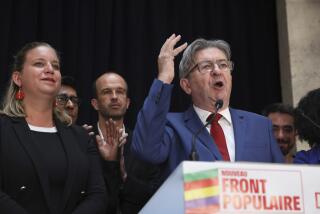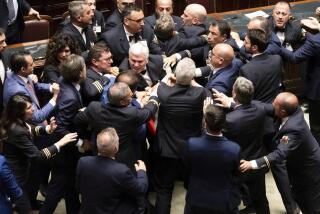Parliamentary Elections May Leave Italy ‘Split in Half’
ROME — Italian politician Romano Prodi claimed victory early today over his bitter rival Prime Minister Silvio Berlusconi in hard-fought elections that cemented deep divisions in this economically beleaguered nation.
Berlusconi supporters immediately labeled Prodi’s proclamation premature. It came even though Berlusconi’s coalition was leading in one of the two races to control Parliament.
Final results from the two-day vote indicated opposing factions were likely to control the two houses of Parliament, a recipe for instability and paralysis that could force new elections.
Prodi opened a bottle of champagne and stepped onto a flag-festooned stage outside his party headquarters around 3 a.m. after official tallies showed his center-left coalition had won a majority by a fraction of a percentage point in the Chamber of Deputies, the lower and larger house of the Italian Parliament.
“Today we turned the page,” Prodi told cheering supporters who had waited hours to hear him. “We must now make the maximum effort to change Italy.”
However, the race for the Senate was not over, and it was Berlusconi’s coalition that held a razor-thin, one-seat lead in that race. Final control will be decided by overseas voters who select six senators and whose ballots had not yet been counted.
The agonizingly slow vote count only added to a sense of unease here. National elections that had been viewed as a referendum on Italy’s famously flamboyant prime minister and an opportunity to jump-start the failing economy became instead a marathon of uncertainty
Berlusconi, 69, is Italy’s longest-serving prime minister since World War II and one of President Bush’s most loyal European allies. But Berlusconi’s government came under heavy attack here for its failure to reform the economy and pull Italy out of recession.
Whatever government emerges, it will be weak and probably short-lived. Neither side has won a clear mandate, and it is virtually impossible to rule without agreement between the two houses of Parliament. The Senate and the Chamber of Deputies must vote to support the prime minister and his Cabinet for them to take office.
After watching the roller-coaster returns, politicians and other observers from both the left and right sounded a unanimous theme.
“The country is split in half,” said Giuliano Ferrara, a Berlusconi supporter and editor of a Berlusconi-owned newspaper, Il Foglio.
“The country is more divided now than ever before in its history,” said Communist Party leader Fausto Bertinotti, a member of Prodi’s coalition.
Turnout was slightly higher than in the last elections five years ago: nearly 84% of approximately 47 million eligible voters cast ballots, the Interior Ministry said. Berlusconi had said that the higher the turnout, the better his chances for victory.
Prodi and his coalition led in opinion polls for many months and had been widely expected to win. To most voters, the elections were about two things: Berlusconi, and Berlusconi’s handling of the economy.
As Italy’s richest man presiding over a business empire that includes television stations and a powerhouse soccer team, Berlusconi had for years dazzled the political scene with his brash charm.
When he became prime minister in 2001, many Italians believed he would apply his successful business acumen to the national economy and make good on campaign promises to spread prosperity. Instead, Italy’s economy today is one of the weakest in all of Europe, saddled with an enormous public debt and with little or no growth.
“Berlusconi came in with such big expectations and hopes, and he did not deliver. In the end, people were fed up,” said political analyst Franco Pavoncello of Rome’s John Cabot University.
But Berlusconi waged a tough, provocative campaign. He invoked the ingrained fear of the left by portraying his opponents as hard-core communists, and made dramatic last-minute offers to cut taxes.
Even a number of outrageous comments, seen from the outside as embarrassing gaffes, endeared him to many supporters and some fence-sitters. And despite his vast wealth, he successfully portrayed himself as an underdog persecuted by an overzealous judiciary and traditional political elite.
“I voted for Berlusconi because I love him -- like being in love with a criminal,” said Viera Alexandroff, 44, a pharmacist from southern Italy. “Like a criminal who has done many robberies but who is never caught by the cops. He is clever. He is an entrepreneur who has taken risks” and succeeded.
As much as he has delighted his followers, Berlusconi has been reviled by his foes. He leaves no one indifferent.
Stefania Maurino, a teacher of law at a Rome high school, said Berlusconi’s reelection would be a tragedy.
“He has made a mockery of the country for five years,” Maurino, 53, said. “I teach my students that the constitution says one thing, and the next day they come back and say, but Berlusconi did the opposite thing. How can you get students to respect the constitution like this?”
Prodi, 66, a former president of the European Commission, never lighted a fire in the heart of the electorate. He sought to use his dull image to his advantage, promising “serenity” at the head of government instead of the sometimes wacky behavior that has marked Berlusconi’s leadership.
Late Monday and early today provided a cliffhanger to a bitter campaign as Italians waited for the votes to be counted.
Outside Prodi’s headquarters in Piazza Santi Apostoli, a crowd stared dumbfounded at large television screens broadcasting the results. Prodi twice postponed a victory speech before finally appearing in the wee hours of the morning.
If Prodi’s coalition takes control of the lower house and Berlusconi’s the upper, the two sides could attempt to form a “grand coalition,” but many observers consider that unlikely. The government could also call for new elections.
“I do not think it will be possible to govern; this is an ungovernable Parliament,” said Sen. Paolo Guzzanti of Berlusconi’s Forza Italia party. “It looks to me like we will be voting again in November.”
Special correspondent Livia Borghese contributed to this report.
More to Read
Sign up for Essential California
The most important California stories and recommendations in your inbox every morning.
You may occasionally receive promotional content from the Los Angeles Times.











